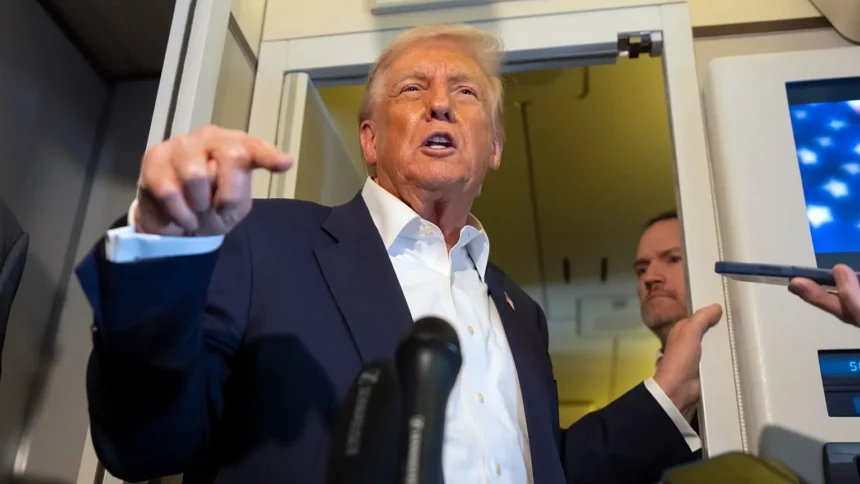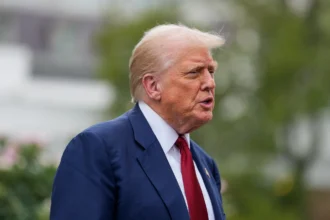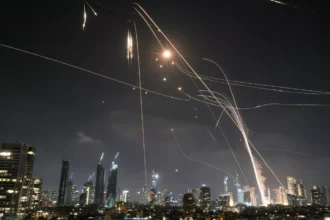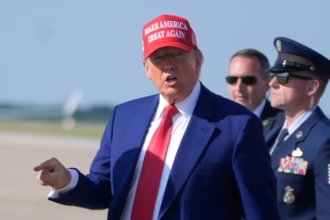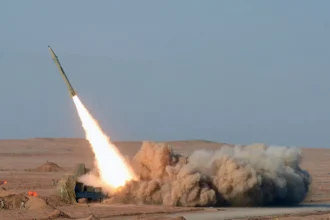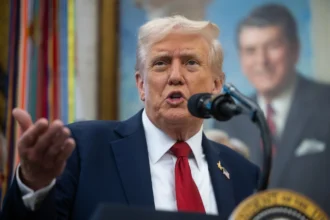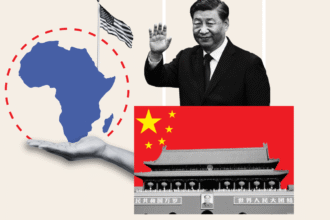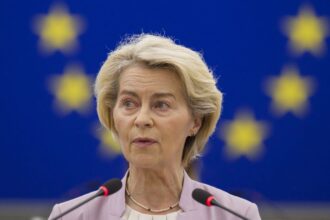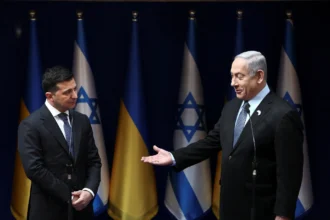In a statement that has already stirred geopolitical debate, U.S. President Donald Trump publicly urged Russian President Vladimir Putin to stop “testing missiles” and instead move toward ending the war in Ukraine. The remarks, made during a policy forum and echoed in follow-up comments online, signal Trump’s latest attempt to position himself as a potential broker of peace in a conflict that has dominated international politics since early 2022.
A New Tone From Trump—Pressure on Moscow, Not Washington
Trump, who has long been criticized for being too accommodating toward Russia, struck a sharper tone this time:
“Instead of testing missiles and escalating, Putin should end this war. It should be done very quickly, and it should never have started,” Trump said. “Everyone knows I can make it happen. Peace is possible—now.”
His statement follows news earlier this week that Russia conducted another intercontinental ballistic missile test, amid rising tensions with NATO members and an expanding military alignment between Moscow and North Korea. Trump condemned the launch as “provocative and unnecessary”, adding that Russia should “focus on peace instead of weapons demonstrations.”
Why Trump’s Words Matter Now
The timing of Trump’s statement is significant. The Ukraine conflict has reached a dangerous stalemate:
- Ukraine faces ammunition shortages and delayed Western military aid.
- Russia has gained ground in strategic regions such as Donetsk.
- Europe fears war fatigue as energy and defense costs surge.
- The U.S. Congress remains divided over new Ukraine funding.
- Peace negotiations remain frozen, with neither Kyiv nor Moscow budging on conditions.
Trump’s comments appear aimed at reframing the war as a solvable political problem, rather than a centuries-old territorial struggle. According to advisers close to his camp, his team is reportedly outlining a 90-day peace negotiation framework if he returns to office—one that would involve direct talks with both Putin and Ukrainian President Volodymyr Zelensky.
Trump Positions Himself as a Deal Maker—Again
Since leaving office, Trump has repeatedly claimed he could end the Ukraine war “within 24 hours” by forcing both sides into a settlement. While critics dismiss this as unrealistic, recent comments show he is now shifting toward more pragmatic diplomacy, staking out clear expectations for Moscow:
| Trump Message | Strategic Goal |
|---|---|
| Stop missile tests | Pressure Russia to reduce military intimidation |
| Ceasefire first | Install framework for negotiations |
| Leverage sanctions | Use U.S.-EU sanctions as bargaining chips |
| Push NATO diplomacy | Engage Europe in peace terms |
| Maintain Ukraine sovereignty | Avoid perception of Russian victory |
Reaction From Moscow and Kyiv
The Kremlin did not immediately issue a formal response but Russian state media covered Trump’s comments extensively, portraying them as a sign that U.S. political leadership may shift away from “endless war.” One pundit on Channel One Russia said: “Trump speaks the language of business. This could be an opening.”
In Kyiv, the reaction was more cautious. An advisor to President Zelensky said:
“If Mr. Trump can bring peace without sacrificing Ukrainian territory or freedom, we would be open to his ideas. But Ukraine will never surrender its independence.”
What Trump’s Peace Terms Might Look Like
While Trump has not publicly shared a full peace plan, sources close to his circle suggest several key pillars likely to define his approach:
✅ Potential Trump Peace Components
- Immediate ceasefire along current battle lines
- Security guarantees for Ukraine without immediate NATO membership
- Referendum negotiations for disputed territories under UN supervision
- Crude oil sanctions relief for Russia in exchange for demilitarization
- A U.S.-Russia strategic stability summit to control nuclear escalation
Critics say such a plan risks freezing the conflict and legitimizing Russian gains. Supporters argue it is better than perpetual war.
European Leaders React
European reaction is split:
| Country | Response |
|---|---|
| Germany | Warns peace must not reward aggression |
| Hungary | Praises “realistic diplomacy” |
| France | Urges dialogue but rejects territorial concessions |
| UK | Supports continued military aid before peace |
What Comes Next?
Analysts say Trump’s comments reflect a growing global appetite for a negotiated end to the conflict as economic pain spreads and military fatigue deepens.
But they also raise major questions:
- Would Russia agree to pause its military gains?
- Would Ukraine accept a ceasefire without full territorial restoration?
- Could Trump undermine current U.S. policy before any election?
- Will China respond, given its strong ties to Moscow?
For now, Trump has opened a new rhetorical front—direct public pressure on Vladimir Putin. Whether it leads to real diplomacy or remains political positioning remains to be seen.
Conclusion
Trump’s message to Putin—“stop missile tests and end the war”—marks a turning point in his Ukraine strategy. No longer framing himself just as an outsider critic, he is now openly courting the role of global negotiator. The war in Ukraine may be far from over, but Trump wants the world to believe he’s the only one who can end it.

